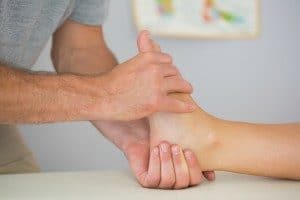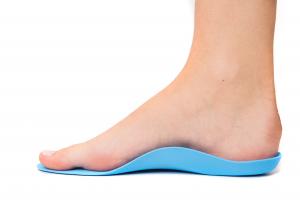
Plantar Fasciitis Exercises and Home Care

It is very likely that on your first appointment to discuss your plantar fasciitis, your podiatrist will recommend some Plantar Fasciitis Exercises and in-home treatment methods. These simple treatments are ones you can perform on your own. After some experimentation, you will likely find the method (or combination of methods) which works best for you.
Some plantar fasciitis home remedies are:
- Give your feet a rest. Reduce or eliminate those activities that might be the cause of your heel pain.
- Only use footwear with proper support. Footwear with good heel cushioning and arch support will reduce the pressure and shock that walking and running have on your feet.
- Use over-the-counter shoe inserts (orthotics). Many retailers carry shoe inserts made of felt, rubber or plastic. When properly used, shoe inserts can reduce pulling and tension on the plantar fascia ligament.

- Regularly ice your heel after Plantar Fasciitis Exercises. Ice will reduce swelling. If you are using contrast baths (alternating cold and hot water) always end with cold water. Some people find this helpful but heat by itself can worsen the symptoms in some people. If, after 2 or 3 days, you find that ice packs are not helping, try moderate heat. For example, a heating pad on the lowest setting may help.
- Nonsteroidal anti-inflammatory drugs (NSAIDs), such as ibuprofen (brand names Advil or Motrin), naproxen (brand name Aleve), or other can be used to reduce the pain bring down the inflammation. Always read all the information on the labels before taking any medications. Direct any questions to the pharmacist or doctor. All NSAIDs come in pill form and some come in a cream that can be rubbed over the trouble area.
- Wear a splint at night. Night splints are designed to softly extend the Achilles tendon and plantar fascia ligament while you sleep. They prevent the tendon and ligament from tightening while you sleep, therefore reducing pain in the morning.
Exercises and ESWT
- Stretch and complete strengthening exercises. By exercising you will strengthen the ankle and foot muscles leading to a better supported the arch. Exercises that stretch the Achilles tendon and plantar fascia will lead to increased flexibility.
- ESWT often helps plantar fascia ans Achilles tendon pain when all other conservative methods fail. Read more info at Sound Medical
How Can You Prevent Plantar Fasciitis In Future?
1. Avoid Standing For Long Periods
To prevent plantar fasciitis in future you need to make sure you don’t stand for long periods!
When you stand still for a long time your fascia stretches continuously which makes it easier for injuries to develop which later causes plantar fasciitis.
If you are a teacher, nurse, hairdresser or chef then you are more prone to plantar fasciitis since these jobs requires standing a lot.
Its true that you can’t change your job but you can take short breaks and give rest to your feet by sitting for a while.
Thus will reduce the pressure on your fascia and decreases chances of plantar fasciitis!
2. Recognize Early Signs And Treat The Problem Right Away
Sometimes plantar fasciitis is unavoidable, for example an injury or sudden stretch can cause you plantar fasciitis out of nowhere.
In such cases you must get the treatment right away, you shouldn’t delay the treatment.
If you feel pain in your foot, especially in the middle or feel sudden pain in the morning then its probably plantar fasciitis.
You must get the treatment done before your situation gets worse, if you ignore the problem then something scary like fascia rupture can happen!
3. Lose Excess Weight
Excess weight is the root of many health problems and how it can cause you plantar fasciitis too.
Too much weight means too much pressure on your feet which can develop injuries on your fascia.
So you must try works outs and adapt a healthy diet, this will probably help you prevent this problem.
Pregnancy can also cause plantar fasciitis since it’s a kind of weight gain but you shouldn’t worry about it.
Once you deliver your baby the fascia problem will stop automatically, but make sure to get the treatment or you may damage your fascia even more!
How long does it typically take to recover from plantar fasciitis?
The recovery time for plantar fasciitis varies, but it often takes several weeks to months. Mild cases may improve with rest, stretching, and supportive footwear within a few weeks. However, more severe or chronic cases may require longer-term interventions, such as physical therapy, orthotics, or in some cases, surgery.
Can certain medical conditions increase the risk of plantar fasciitis?
Several medical conditions can heighten the risk of developing plantar fasciitis. Obesity is a significant factor, as excess weight places added stress on the plantar fascia ligament. Conditions like diabetes, which can affect nerve function and circulation, may contribute to foot problems, increasing vulnerability to plantar fasciitis. Autoimmune disorders, such as rheumatoid arthritis, may lead to inflammation, impacting the plantar fascia. Structural abnormalities like high arches or flat feet alter foot mechanics, potentially straining the ligament over time.
Additionally, occupations or activities that involve prolonged standing, walking on hard surfaces, or wearing unsupportive footwear may exacerbate the risk. Understanding these predisposing factors is crucial for both prevention and targeted treatment. Individuals with these conditions should prioritize weight management, choose supportive footwear, and consider orthotic inserts.
Are there any complications associated with untreated plantar fasciitis?
Untreated plantar fasciitis can lead to complications such as chronic heel pain, changes in gait to alleviate discomfort, and foot, knee, hip, or back problems due to altered biomechanics. Ignoring symptoms may result in persistent discomfort and reduced mobility, impacting daily activities and overall quality of life. Early intervention is key to prevent complications.
Can physical therapy be beneficial for individuals with plantar fasciitis?
Yes, physical therapy can be highly beneficial for individuals with plantar fasciitis. Therapists may prescribe targeted exercises to strengthen foot muscles, improve flexibility, and correct gait abnormalities. Additionally, they provide guidance on proper footwear and recommend strategies to manage pain, promoting effective and personalized recovery for individuals with plantar fasciitis.

